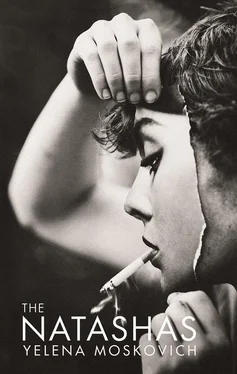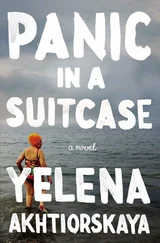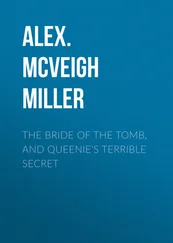“Yes?” Sabine looked up.
“Well, he told me to…” César didn’t want to say it.
“Yes, Marcel told you to…?” Sabine inquired.
“Um.”
César moved his lips around as if he had to sneeze. He was trying to buy time. Maybe she’d say it for him. Sabine waited patiently as César squirmed.
“Yes, I’m listening. Marcel told you to…?”
“To…uh… well… he… told me… to take you… for a walk .” César’s eyes dropped down to Sabine’s folded legs.
“Marcel told you to take me for a walk ?”
César looked instantly away, unable to face Sabine’s eyes.
“Yeah…”
César waited for Sabine to respond but she remained nailed-still. His eyes skimmed the floor and found a stepped-on cigarette butt encrusted in a crack. He shuffled his hands in his pockets and followed the crack with his eyes. What would this woman do? Would she scream at him? No, she didn’t seem like the type. Would she scold him for his choice of words? More probable. Would she huff at his ignorance and run off? (Surely not run, she was in a wheelchair.) César blushed privately at this thought.
Sabine spoke up in a strong, definite tone. “Come on then.
Take me for a walk.”
14
César manoeuvred the wheelchair around the crowded train station towards the exit. It was not as easy as he assumed it would be. The route to the main entrance became a series of starts and stops, spotted with points of panic as he avoided oncomers, trying to get the chair back under control so Sabine’s lifeless knees would not knock a child’s teeth out.
Sabine did not flinch once. She sat upright and poised, her torso like a plastic mannequin fixed to the chair. When César finally managed to get out of the train station, she spoke. “Let’s go down to the canal.”
César did not have much choice. He said “Okay” and sighed as he pushed the wheelchair over the brick-lined road.
15
People are a lot heavier sitting down, even if they have wheels attached. César struggled forward, but every couple of minutes had to jolt out of the way of a stranger who saw César clearly, but happened to miss Sabine, just below.
As they approached the canal, he started up the flat cement road which ran alongside the cafés. But Sabine asked to be closer to the water, so he was obliged to cross the street and join the cobblestone passageway. The wheelchair grumbled over the stones.
Along the edge of the canal, young people sat with bottles of wine or cans of beer at their feet; an open bag of chips, half indented like a couch cushion. Some had a proletarian-style picnic: bread, cheese, meat. In these groups, the guys wore loose long-sleeve shirts in earth-tone colours. Their fingers rolled cigarettes and their eyes gazed in intervals, at their friends and at these wondrous people called strangers.
Other groups were young people who were newly initiated into the job market, which was deflated except for the ever-booming sectors dealing with consumer appetites: advertising, marketing, business. They wore high-quality fabrics, cut and sewed together to both integrate and rebel against the fashion status quo. They pecked at green olives in plastic containers, slices of chorizo or salami, and broke up pieces of bread from baguettes; a container of oily grated carrots was open but untouched. A guy shuffled chips from a tube of Pringles and crunched them mechanically, unaffected by their taste. Then, of course, there was the discreetly luxurious group with their apéro-hour picnic, coal-black bottles of Freixenet Spanish Cava, organic cider, parmesan crackers, grain and seed crackers, rice crackers, hummus, eggplant dip, and multiple containers of strawberries ( Oh, look at that, you also brought strawberries! ). These were Scandinavians who had at some point “lived in London”, Anglophones who were at some point “from New York”, musicians just arrived from Germany or Japan and other artists from more exotic countries: Russia, Turkey, Iran.
A mixed group of Spanish and Italians spoke and ate and drank and listened to each other very loudly. They brought tupperwares of tapas and tall cans of cheap beer.
These groups of young people glanced casually at César and Sabine as they passed. Some remarked with hushed words. Some pointed at them with their chins. Others just looked away. César couldn’t tell if it was his swollen nose or Sabine’s dead legs that drew the attention.
César gripped each handle of the wheelchair and pushed her forward. He was grateful he couldn’t see Sabine’s face and that she couldn’t see his. An agitation rumbled within him. Why did this woman have to make him parade with her like this, in front of all these people, all these young people, so well-adapted and unbothered by themselves?
Relájese, César, relax he heard a gritty man’s voice say to him in his head.
Diz is juss a test. Diz is onlee a test, mi amor.
16
“Closer,” Sabine said.
They had found a free spot near the canal’s edge. César pulled the wheelchair up to the barrier.
“Closer.”
César wasn’t sure if he could get any closer, but he rolled the chair forward a couple of inches until the front of the wheels dubbed against the barrier, and Sabine’s dead legs swayed a couple of times from the impact.
Sabine sat very still. Since he could not see her face, he had no idea what sort of experience she was having in front of the water. Was she bored? Annoyed with him? Most importantly, was she reconsidering what she would report back to Marcel?
“Napoleon ordered the creation of this artificial waterway,” Sabine began, “to provide the people of Paris with fresh water, which of course was a polite way to cut down on diseases such as dysentery and cholera amongst his swelling population. The year was 1802, to be exact. Not long after the first leopard was exhibited in America. Boston, to be exact. February 2nd, to be exact. Admission was 25 cents.”
César bracketed his eyebrows. “Oh.”
“It obviously took a considerable amount of time to build the canal. But once it was in place, it was used as a transportation route, and so factories and warehouses were constructed along the quais. But, of course, times change, the world turns, the earth rotates—once every twenty-four hours from the point of view of the sun to be exact, and of course once every twenty-three hours, 56 minutes and 4 seconds from the point of view of the stars. One can look at it this way: a sticky-faced child makes a wish, and by the time the wish is in orbit, there’s another sticky-faced child making a wish. And so on. Until the sky is full of unsatisfied orbiting wishing, like swarms of buzzing mosquitoes. Skinny, flimsy, dry-mouthed mosquitoes. They land on our skin and with their shaky lips they try to suck some life out, but of course they are too weak and it only gives the surface a slight tickling sensation and they can’t reach the source. However, there are swarms of these wobblylipped wishes, and one day the next sticky-faced child turns to his mother and says, Mama, the world is spinning too fast, I think I’m gunna be sick , and of course before his Mama has time, he’s already vomiting on her shoes.”
César was at a loss. He did not even have a non-verbal sound to give as a response. He nodded in silence.
“What I am leading to, of course, is that by the mid-twentieth century, boat traffic was not as popular as it once was, so this canal was almost turned into a highway for efficiency’s sake. It was a debate. In 1960—60—60—in 1960—.”
“Very nice,” César cut her off. He didn’t mean to, but her speech was making him anxious again.
Читать дальше












